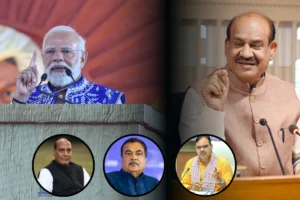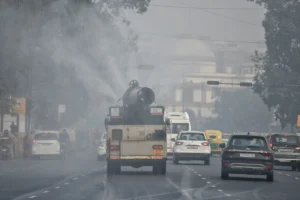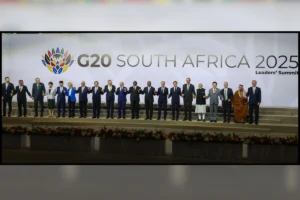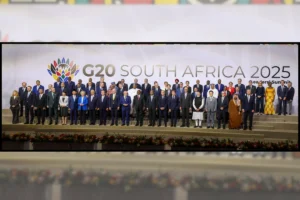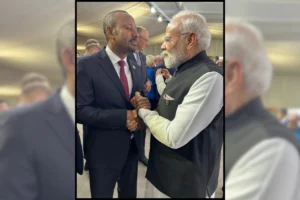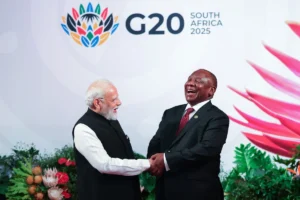
Prime Minister Narendra Modi met South African President Cyril Ramaphosa on Sunday on the sidelines of the G20 Leaders’ Summit at Nasrec, Johannesburg.
External Affairs Minister S Jaishankar, MEA Secretary (Economic Relations) Sudhakar Dalela, and other senior officials accompanied the Prime Minister during the discussions.
The meeting provided a platform to review the current status of India-South Africa relations and identify new areas of collaboration, particularly in security cooperation, economic partnerships, and people-to-people engagement.

President Ramaphosa had warmly welcomed PM Modi upon his arrival in Johannesburg, underscoring the importance of the engagement for both nations.
Addressing the opening sessions of the G20 Summit, PM Modi emphasised the necessity of stronger global cooperation, enhanced disaster resilience, and sustainable development.
In detailed remarks shared by the Prime Minister’s Office, he highlighted India’s human-centric approach to growth and encouraged the G20 to adopt development parameters that balance economic progress with planetary well-being.
PM Modi took to X (formerly Twitter) to elaborate on the discussions, noting that the second session of the Summit focused on building a resilient world against disasters and climate change, ensuring just energy transitions, and strengthening global food systems.
“India has been actively working on all these fronts, building a future that is human-centric and inclusive,” he stated.
The second session at the G20 Summit in Johannesburg focussed on building a resilient world in the face of disasters, climate change and ensuring energy transitions that are just as well as robust food systems. India has been actively working on all these fronts, building a… pic.twitter.com/Iqvh81CxUj
— Narendra Modi (@narendramodi) November 22, 2025
Disaster Risk Reduction and Infrastructure
Reiterating India’s longstanding view that major global challenges require coordinated solutions, PM Modi highlighted the creation of the Disaster Risk Reduction Working Group during India’s G20 Presidency.
He advocated for a shift from a purely ‘response-centric’ model of disaster management to a ‘development-centric’ one, citing the Coalition for Disaster Resilient Infrastructure as an illustrative example.
The Prime Minister also proposed a G20 Open Satellite Data Partnership to make satellite data from G20 space agencies more accessible to developing countries, particularly in the Global South.
This initiative aims to support agriculture, fisheries, and disaster management through improved access to space-based tools.
In addition, PM Modi presented the G20 Critical Minerals Circularity Initiative, promoting recycling, urban mining, and second-life battery innovations to strengthen supply chains and enable cleaner, more sustainable development pathways.
The bilateral discussions between PM Modi and President Ramaphosa reaffirmed the commitment of both nations to deepen collaboration across strategic, economic, and social domains.

The engagement also underscored India’s proactive role in global forums, demonstrating leadership in fostering sustainable, inclusive, and resilient solutions for the challenges of the 21st century.
Also Read: G20 Leaders Adopt Landmark Declaration On Global Crises In Johannesburg
To read more such news, download Bharat Express news apps












